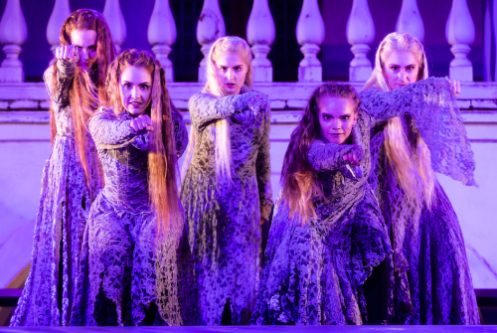 Sweden Verdi, Macbeth: Soloists and ensemble of Läckö Slottsopera, extra chorus, Läckö Chamber Orchestra / Kim Phipps (conductor). Läckö Castle courtyard, 14.7.2023. (NS)
Sweden Verdi, Macbeth: Soloists and ensemble of Läckö Slottsopera, extra chorus, Läckö Chamber Orchestra / Kim Phipps (conductor). Läckö Castle courtyard, 14.7.2023. (NS)

Production:
Director, Translator, Set design – Catarina Gnosspelius
Set and Costume design – Anna Kjellsdotter
Makeup and Wig design – Therésia Frisk
Lighting design – Christian Dahlqvist
Cast:
Macbeth – Andreas Landin
Lady Macbeth – Sigrid Vetleseter Bøe
Banquo – Erik Rosenius
Macduff – Karolina Blixt
Malcolm – Fabian Düberg
Witch / Lady Duncan – Julia Lindgren
Witch / Lady Macbeth’s maid – Tessan-Maria Lehmussaari
Witch / Lady Duncan’s maid – Mathilda Goike
Witch / Fleance – Alba Gutierrez Malmbom
Witch / Jester – Agnes Duvander
Servants in Macbeth’s household – John Kinell, Petter Reingardt
Assassin – Martin Lissel
Doctor – Lars Johansson Brissman
Refugee chorus
Back in 2014, Läckö Slottsopera produced a lovely Falstaff; this year they have chosen Verdi’s first Shakespeare opera. Even more so than usual at Läckö the set is minimal, apart from the backdrop of the castle itself which suits Macbeth down to the ground. Catarina Gnosspelius focusses on the timelessness of the story and the psychological development of the characters.
Anna Kjellsdotter’s costumes have a medieval or Renaissance look, with particular emphasis on headdresses – as the power and pride of the Macbeths grows so do their costumes. The only female characters without headdresses are the witches, symbolizing their freedom from the social codes governing women in a time where might was right.
Verdi himself considered the witches to be one of the three main characters of the opera, along with Macbeth and Lady Macbeth. Läckö’s production has a small ensemble of five witches instead of a larger chorus, but they have no difficulty in immediately gripping the audience in the opening scene. These witches are ordinary women (actual minor characters in the opera) whose witchcraft is a secret rebellion against their limited life in society, meaning that the singers also act and sing these other roles. Alba Gutierrez Malmbom and Agnes Duvander are both recurring members of Läckö’s superbly versatile ensemble and movingly acted as Fleance and the Jester respectively. Tessan-Maria Lehmussaari impressed in her debut at Läckö, transforming from witch to Lady Macbeth’s maid and gripping in both parts.
Choosing mezzo-soprano Karolina Blixt to play Macduff rather than a tenor surprised me, but it turned out to be a very good choice, with Macduff’s music fitting well into Blixt’s dark and expressive voice. She explored Macduff’s guilt at having escaped the terrible fate of his family very movingly in ‘Ah, la paterna mano’. Erik Rosenius was a terrific Banquo, with a rich and expressive bass and heroic stage presence. He and Andreas Landin’s Macbeth worked well together both musically and as comrades in arms in Act I, but Banquo’s forebodings of impending doom in Act II were particularly chilling. His reappearance as a ghost was brilliantly effective.
Fabian Düberg emphasised the youthfulness and impetuosity of Malcolm in an effective contrast with the older and grimmer Macduff. Unusually for Läckö they gathered a large chorus for Act IV. They entered for ‘Patria oppressa’ scattered around the courtyard, which was dramatically effective but less so musically with the sound being unbalanced for the audience. But once they were gathered in front of the stage they had a real spinetingling impact together with the ensemble in ‘La patria tradita’.

Sigrid Vetleseter Bøe soared confidently to Lady Macbeth’s high notes and sang with great clarity, so much so that I could follow almost every word of Catarina Gnosspelius’s excellent Swedish libretto, where she has given Lady Macbeth some lines from Shakespeare that did not make it into the Italian libretto. Her acting highlighted Lady Macbeth’s ambition and her impatience with her sometimes lily-livered husband. But she also displayed Lady Macbeth’s vulnerability in a brilliant sleepwalking scene.
Andreas Landin gave a vivid characterization of Macbeth, with a beautiful and expressive baritone which makes Macbeth believable as a respected soldier and nobleman before his ambition and the prophecies of the witches lead him into bloodshed and increasing paranoia. Landin was just as able at depicting Macbeth’s outbursts to Banquo’s ghost as he was Macbeth’s suddenly shifting moods when he seeks out the witches in the third act. When faced with Birnam Wood marching against him and discovering that Macduff is not ‘of woman born’ Macbeth’s will to live leaves him, with Landin movingly reflecting on the hollowness of Macbeth’s life in ‘Mal per me che m’affidai’.
The Läckö Chamber Orchestra sounded like a full opera orchestra in the wonderful acoustic of the castle courtyard, thanks both to Verdi’s superb scoring and to the conducting of Kim Phipps, which seemed to effortlessly bring out the structure of the music and a great sense of line. The wind players shone particularly in Verdi’s music for the supernatural scenes, where his haunting notes mixed with the cries of the swallows flying above the courtyard to make me feel that I was in the middle of the story myself.
Niklas Smith
Macbeth and Lady Macbeth are sung at certain performances by Lars Johansson Brissman (Macbeth) and Lydia Kjellberg (Lady Macbeth) see the Läckö Opera website.
